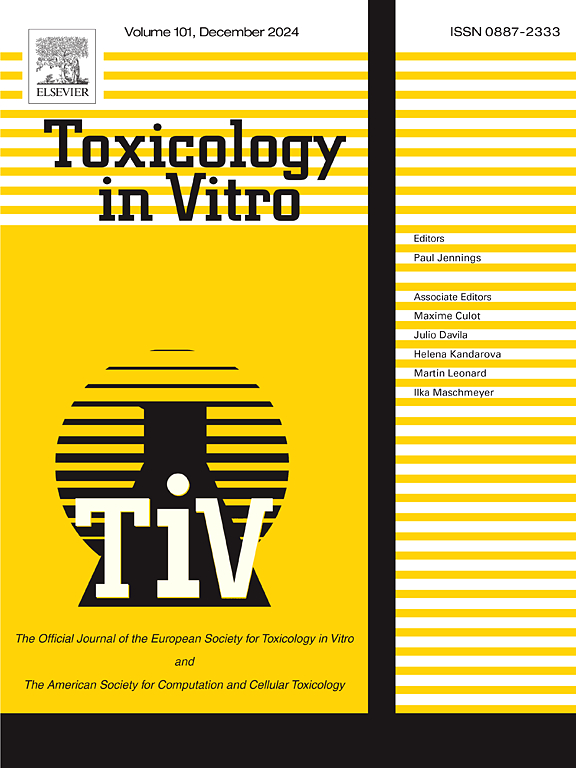Tannic acid modulates SARS-CoV-2 pathogenesis by curbing key host receptors and oxidative stress
IF 2.6
3区 医学
Q3 TOXICOLOGY
引用次数: 0
Abstract
The novel coronavirus SARS-CoV-2, which wrecked havoc around the world in the recent years through COVID-19, gains entry into the host cell through various receptors. Development of therapies targeting host–pathogen interaction will be a key to curb the infection as it potentially suppresses viral attachment and entry into the host. Boundless bioactives abundant in natural resources are the important source of new as well as safer alternatives. Tannic acid, a polyphenolic compound found abundantly in various plant sources, has gained much attention owing to its multifaceted pharmacological properties. This research paper presents a comprehensive investigation on antioxidant, anti-inflammatory and anti-viral abilities of tannic acid, substantiated through a triad of methodologies: in silico, in vitro and in vivo approaches. In vitro experiments, confirmed the antioxidant and anti-inflammatory efficacy as well as the host receptor modulating potential of tannic acid. In silico docking analyses elucidated the molecular interactions between tannic acid and key host receptors involved in inflammation and viral pathogenesis. Furthermore, the in vivo studies involving Danio rerio provided a holistic understanding of the systemic impact of tannic acid, including its antioxidant effects by mitigating the oxidative stress.
单宁酸通过抑制关键宿主受体和氧化应激调节 SARS-CoV-2 的发病机制
近年来,新型冠状病毒 SARS-CoV-2 通过 COVID-19 在全世界造成了严重破坏,它通过各种受体进入宿主细胞。开发针对宿主-病原体相互作用的疗法将是遏制感染的关键,因为它有可能抑制病毒附着和进入宿主体内。自然资源中丰富的生物活性物质是新的和更安全的替代品的重要来源。单宁酸是一种多酚类化合物,大量存在于各种植物资源中,因其多方面的药理特性而备受关注。这篇研究论文介绍了对单宁酸抗氧化、抗炎和抗病毒能力的全面研究,并通过三重方法:硅学、体外和体内方法进行了证实。体外实验证实了单宁酸的抗氧化和抗炎功效以及调节宿主受体的潜力。硅对接分析阐明了单宁酸与参与炎症和病毒致病过程的关键宿主受体之间的分子相互作用。此外,通过对丹利鱼的体内研究,人们全面了解了单宁酸对全身的影响,包括通过减轻氧化应激产生的抗氧化作用。
本文章由计算机程序翻译,如有差异,请以英文原文为准。
求助全文
约1分钟内获得全文
求助全文
来源期刊

Toxicology in Vitro
医学-毒理学
CiteScore
6.50
自引率
3.10%
发文量
181
审稿时长
65 days
期刊介绍:
Toxicology in Vitro publishes original research papers and reviews on the application and use of in vitro systems for assessing or predicting the toxic effects of chemicals and elucidating their mechanisms of action. These in vitro techniques include utilizing cell or tissue cultures, isolated cells, tissue slices, subcellular fractions, transgenic cell cultures, and cells from transgenic organisms, as well as in silico modelling. The Journal will focus on investigations that involve the development and validation of new in vitro methods, e.g. for prediction of toxic effects based on traditional and in silico modelling; on the use of methods in high-throughput toxicology and pharmacology; elucidation of mechanisms of toxic action; the application of genomics, transcriptomics and proteomics in toxicology, as well as on comparative studies that characterise the relationship between in vitro and in vivo findings. The Journal strongly encourages the submission of manuscripts that focus on the development of in vitro methods, their practical applications and regulatory use (e.g. in the areas of food components cosmetics, pharmaceuticals, pesticides, and industrial chemicals). Toxicology in Vitro discourages papers that record reporting on toxicological effects from materials, such as plant extracts or herbal medicines, that have not been chemically characterized.
 求助内容:
求助内容: 应助结果提醒方式:
应助结果提醒方式:


